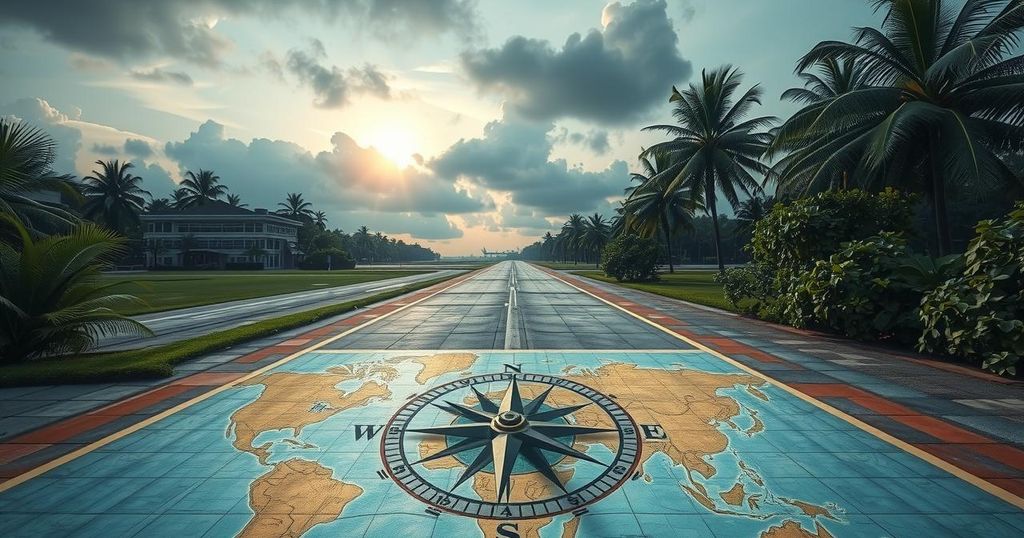The M23 armed group, supported by Rwandan troops, has taken Goma’s airport, escalating conflict in the DRC and causing significant casualties and humanitarian crises. With nearly 1,000 injured and many fleeing, international reactions have included protests against several embassies and calls for intervention. Accusations against Rwanda add complexity to the already volatile situation, prompting emergency discussions among African leaders.
On Tuesday, an armed group aligned with Rwandan forces took control of the airport in Goma, a key city in the Democratic Republic of Congo (DRC). This acquisition follows three days of intense fighting that resulted in over 100 fatalities and nearly 1,000 injuries. The Tutsi-led M23 group has dramatically escalated the conflict, threatening the authority of the Congolese army, which has lost significant territory in North Kivu province.
The recent violence has left Goma’s streets desolate, with heavy fighting reported as M23 fighters entered the city. There remains confusion regarding the territorial control of various parts of Goma. Reports indicate that the M23 has taken Goma’s airport, leading to the surrender of over 1,200 Congolese soldiers who are now confined at the UN base nearby.
This heightened conflict is reminiscent of the aftermath of the Rwandan genocide, with a humanitarian crisis unfolding as the UN reports significant displacement, food shortages, looting, and overwhelmed hospitals. Goma, a city of approximately one million, is suffering as civilians flee amidst the chaos, with some sharing harrowing experiences of violence and death.
In response to the unrest, protests erupted in Kinshasa, targeting embassies from multiple nations, including Rwanda and the United States. Following attacks on their facilities, the U.S. Embassy advised citizens to evacuate. The European Union expressed concern, labeling the protests as unacceptable, while humanitarian organizations warned of the dire conditions facing wounded civilians at local hospitals.
The United Nations has documented instances of ethnic violence in Goma, reinforcing fears that the ongoing conflict could reignite historical tensions. The UN Security Council’s response to the situation has been criticized as inadequate, which has prompted stronger calls for intervention. In light of accusations against Rwanda for exploiting DRC’s mineral wealth, discussions regarding regional stability continue as both countries seek resolution.
As the DRC government grapples with the escalating crisis, an emergency meeting of the African Union emphasized the need for the M23 to cease hostilities. Concurrently, Kenya announced a summit to address the scenario involving the DRC and Rwandan leaders. The M23’s resurgence poses complex challenges reminiscent of historical conflicts.
The ongoing crisis in the DRC, particularly in the eastern region, is deeply rooted in the legacy of the Rwandan genocide and its aftermath. Since the M23’s initial emergence in 2012 and subsequent regrouping in 2021, the group has regained substantial military ground in North Kivu province. The conflict has led to significant humanitarian challenges as civilians are caught in the crossfire, exacerbating existing tensions and fears of ethnic violence. In recent months, the situation has been further complicated by accusations against Rwanda, with tensions flaring as the Congolese government seeks stronger international support to address the armed groups operating within its borders. The region’s wealth of minerals such as gold and coltan adds another layer of contention as various external influencers vie for control and access. As this crisis develops, the global community watches closely, with numerous nations involved in diplomatic efforts to stabilize the region, while humanitarian organizations work tirelessly to respond to urgent needs on the ground.
The capture of Goma’s airport by Rwandan-backed forces represents a critical turning point in the DRC’s ongoing conflict, with dire humanitarian implications for the region. As fighting escalates, civilian casualties mount, and calls for international intervention grow louder. Accusations against Rwanda further complicate the situation, with both regional leaders attempting to negotiate a resolution amid increasing instability. The convergence of historical grievances and current geopolitical strife necessitates urgent attention to prevent a broader humanitarian catastrophe.
Original Source: www.kulr8.com






